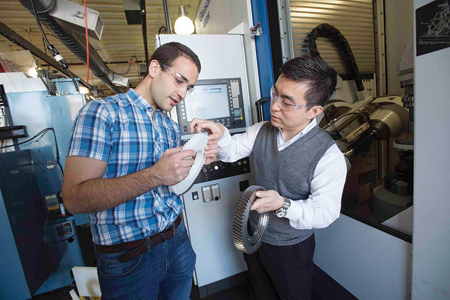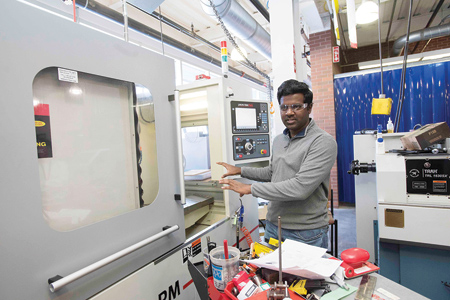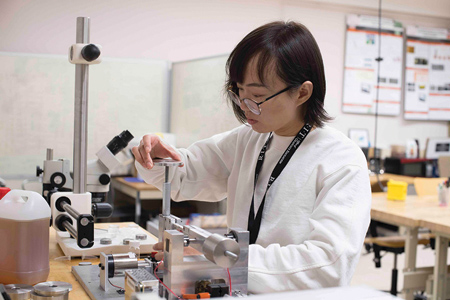
Professor Rui Liu, right, discusses the intricacies of gear structural development with doctoral candidate Eloy Yague-Martinez.

Much of doctoral student Achyuth Kothuru's work is in the area of improving manufacturing processes and integrating more AI techniques into system.

Doctoral candidate Hong Guo is testing various alternative materials to be added to current gear lubricants to decrease the impact of wear on equipment.
Gears make the industrial world go around, and Rochester Institute of Technology (RIT) engineering faculty and doctoral students are working to keep them moving efficiently.
"Gears transmit the motion necessary to operate the equipment assembling today's consumer goods, among many other applications," said a spokesperson. "But with increasing demands on equipment for more power, longer service life and lighter weight, companies can also expect gearbox failures due to wear and tear. RIT's Gear Research Laboratory team is helping improve gear technology."
"We have long been aware of the significant economic impact of wear and friction between mechanical components as they result in energy losses and shortened part lifespan," said Patricia Iglesias-Victoria, Associate Professor of Mechanical Engineering and part of the Gear Research Lab. "But there is also an environmental impact to consider, because most of the lubricants in use today are petroleum-based and contain toxic additives. We know they can reduce friction and wear efficiently, but we want to move into a more environmentally friendly direction."
The group's direction is toward developing computational tools to achieve the best gear designs and increase the power density of gear transmissions, thereby decreasing the impact of wear on gears and making improvements to manufacturing processes. The work is being done through collaborations with Gleason Corp., one of the top gear and system manufacturers in the country. In 2016, the company, a long-time partner of RIT and the Kate Gleason College of Engineering, established the Gleason Doctoral Fellowships to further collaborations in gear design and manufacturing research.
Results from the first group of fellows, Eloy Yague-Spaude, Achyuth Kothuru and Hong Guo, are providing solutions in multiple facets of gear development-from design and manufacturing processes to sustainable materials-that might change industry practices.
Making Gears
The RIT Gear Research Laboratory was established by Alfonso Fuentes-Aznar, Associate Professor of Mechanical Engineering, in collaboration with international partners from the Polytechnic University of Cartagena (Spain). The partners developed Integrated Gear Design (IGD), a sophisticated software program used to design, analyze and optimize gear geometry-the structure and configuration-taking into account manufacturing processes and simulating actual performance. This information is integral to understanding gear lifecycles and provides a platform for how improvements can be made in gear design.
"We try to improve the mechanical performance and power density of any kind of gear drive by studying and improving its geometry," said Eloy Yague-Spaude, a doctoral candidate from Spain.
Yague-Spaude's work focuses on strain wave gear drives and tests the strength of gears prior to mass production, proposing improvements based on operation simulations. First patented in 1959, strain wave gear drives are reliable stalwarts of industry, providing the gear reduction necessary to accurately convert motion in small and light-weight applications.
"Which is what we are interested in," said Yague-Spaude. "My aim is to better explain gear behavior by developing models and simulations to improve the behavior and to understand how to make better, more reliable joints. These gears are used for robots, in aerospace applications, machining tools, medical equipment-basically anything that has space and size constraints that require a huge conversion of motion."
Performing this type of stress analysis by modifying the geometry and increasing power density is a way to improve gear capabilities.
Improving Operations
In helping to move companies forward, doctoral student Achyuth Kothuru is incorporating artificial intelligence techniques into tool condition monitoring systems to improve manufacturing operational processes.
"The manufacturing industry is transforming to integrate computers and advanced processing systems so that they could build more automated factories. They could be more intelligent in higher production scenarios," said Kothuru, who is from India. "My work comes under assisting this transformation by providing information about the systems that could actually have these intelligent capabilities, to better monitor processes and to optimize automation without the intervention of humans."
His work entails developing models that mimic human operators to some extent, essentially "teaching" the system to understand the manufacturing process so it can monitor itself.
"We have a system that can monitor the ongoing manufacturing process and detect typical anomalies during that process," he said. "Then the cutting parameters can be optimized with this information toward an uninterrupted manufacturing process."
One goal of this project is to help the machining field facilitate the implementation of Industry 4.0. Research and improvements have occurred in these areas in the past 10 years, but it is more in research than actual transformation in the field in practical applications.
"Much of the terms today include smart manufacturing," said Rui Liu, Assistant Professor of Mechanical Engineering and part of the Gear Research Lab team. "Many systems are automated, in doing the process, but they are not necessarily self-aware, going through the process. The primary challenge would be coming up with a solution where you can actually integrate this into the practical scenario."
Understanding Tribology and Friction
One of those applications is in the area of tribology-the science of understanding the intersection of wear, friction and lubrication.
"Many people may not be aware of tribology-it involves friction, wear and lubrication. When two component surfaces rub together, it will lead to friction and wear. Use of lubricants will reduce friction and wear between the materials," said Hong Guo, a doctoral candidate from China. "Our goal is to develop more efficient and more environmentally friendly lubricants and additives to be used in the mechanical elements, particularly in the gear box, the pistons and turbines."
The work is complex and involves understanding materials science as much as engineering principles. The search for alternatives to traditional gear lubricants is developing.
Guo's research into the use of ionic liquids-a class of salts that are liquid at ambient temperature-has shown promise of being an alternative to commercial oils currently used as gear lubricants. Her work is in validating this option further and understanding, from the molecular level, how stable the materials are and how the ionic liquid films fully protect surfaces from high heat and wear over time.
"The study of environmentally-friendly ionic liquids in lubrication is very recent," Guo explained. "These liquids have a lot of unique properties, such as low melting point, high thermal stability-which means they can be used in very high temperature conditions without decomposition-and other properties such as high thermal conductivity and different polarity."
Work continues in keeping manufacturing equipment at optimal conditions. The Gleason Doctoral Fellowship program has been renewed, and the mechanical engineering department has added more courses in tribology and computational gear analysis to further prepare its students for careers in the evolving manufacturing industry.
For more information contact:
RIT
One Lomb Memorial Drive
Rochester, NY 14623
585-475-2411
www.rit.edu